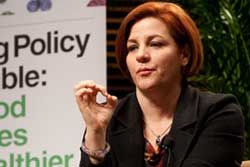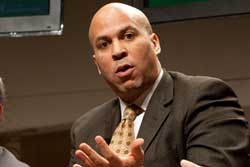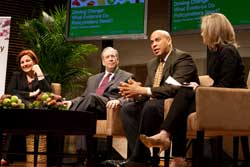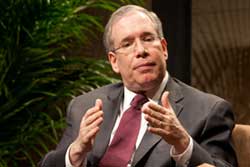A Problem We Can Fix
Cory Booker, Christine Quinn and Scott Stringer talk about why they're focusing on food
“This is a crisis of profound proportion that’s rotting the core of the country. It should be motivating all of us, because the obesity and type 2 diabetes rates amongst our children are epidemic. I live in one of the poorest census tracts in the Northeast, and I see this every single day.”
The speaker at TC’s Valentine’s Day nutrition conference was Newark Mayor and Teachers College Trustee Cory Booker, who recently made headlines by putting himself on a SNAP diet to dramatize the importance of the program in helping low-income Newark residents. (SNAP, formerly known as Food Stamps, is the U.S. Department of Agriculture’s Supplemental Nutrition Assistance Program, which serves 47 million Americans.) Speaking as part of a panel discussion titled “Driving Change: What Evidence Do Policymakers Need?” Booker, who co-chairs First Lady Michelle Obama’s “Let’s Move!” initiative, and New York City politicians Christine Quinn and Scott Stringer argued that food issues profoundly affect their constituents lives on a variety of levels.
“We’ve tried to think about how we could use the food system to reduce and end hunger and also improve health in our city – not just in the sense of obesity, but in how we move food around the city, and can we do that in a way that’s less negative to our air quality,” said Quinn, New York City Council Speaker, who spearheaded the Council’s groundbreaking 2011 report, FoodWorks: A Vision to Improve NYC’s Food System. The report was the first “ground to garbage” look at the city’s food system, Quinn said, covering agricultural production, processing, distribution, consumption and post-consumption – including a study of the feasibility of doing curb-side composting. “How do we use food as an economic engine, because the best way to end hunger is to make sure people have jobs in which they can buy enough food to sustain their families. So we’ve tried to look at this in a much more connecting-the dots kind of way.”
Under Quinn, the Council has instituted zoning changes that have brought quality supermarkets to poor neighborhoods that didn’t have them, creating jobs in the process. Quinn is also leading efforts to negotiate an expanded lease for the Hunt’s Point Cooperative Market in the Bronx.
Stringer, who is Manhattan Borough President, reiterated the need for a comprehensive approach to promote healthy eating, but warned again taking “top down” approaches in dealing with communities. Not long after taking office, Stringer recounted, he himself made that very mistake, calling a meeting in East Harlem to unveil a grand plan centered on food. Eight people showed up.
“It was a very awakening moment for me,” he said. “We went back and asked people what they wanted for a sustainable, healthy community, and you know what we learned? People didn’t really trust the big hospitals. They wanted a place where they could go and test their kids for asthma and learn about mold and all those issues. So we worked with Mayor Bloomberg and the Council to build a stand-alone asthma center. People said, ‘How come we hear about green building development downtown, but uptown we don’t ever hear about silver leaf and gold leaf on our development projects?’ So we called a conference of superintendents and developers and said, ‘Let’s develop a protocol with the community.’ The people in El Barrio said, ‘We have no trees,’ so we worked with [singer and philanthropist] Bette Midler and the Parks Department to bring everyone together and start planting some trees around here. And finally, we said, in terms of healthy food, we’ve got to get the store owners and restaurateurs, who already have these wonderful community dishes in all these different cultures and backgrounds – how can we bring them to the table and talk about healthy recipes and healthy eating?”
The latter effort resulted in the publication of The Go Green East Harlem Cookbook, printed in English and Spanish, which Stringer edited and which his office has since distributed widely across the city and beyond.
“The point is, if we’re really going to be able to lift up people, health-wise, we need to get out into every community and make the case,” Stringer said. “Then all of our larger discussion will actually resonate.”
But in order to connect with communities, the panelists agreed, policymakers, philanthropists and others need to revise their preconceptions about who they’re dealing with.
“There are horrible, horrible stereotypes about SNAP,” said Booker. Counter to popular misconception, he said, the program serves those in genuine need – children, the elderly and people with disabilities.
“The SNAP dollars take a large percentage of recipients who are right below the poverty line and move them above the poverty line,” Booker said. “In my city alone, it brings tens of millions of dollars into our local economy – everything from our bodegas to our grocery stories – creating jobs.”
He added that experiencing the SNAP diet “expanded my compassion” for his long-time Newark neighbors, many of whom are on the assistance program. “When I was buying a limited amount of food and eating the same amount of food every day, I found myself, by day three, craving Ben and Jerry’s more than ever before in my life,” he said, to laughter.
“We’ve seen the number of people using SNAP at green markets skyrocket,” Quinn said. “They’re not buying pretzels and cookies. They’re using it buy fruits and vegetables.”
Asked why she has chosen to focus so much time and energy on food, Quinn replied, “Look, there are problems out there we don’t know the solutions to – diseases we have no idea how to cure. But hunger and obesity is a solvable problem. I was drawn to this because I really think it’s something we can fix.”
Published Saturday, Feb. 23, 2013



